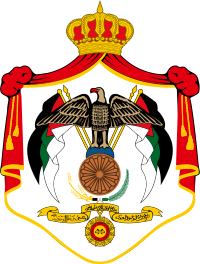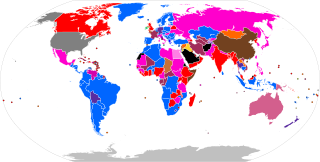| |||
| |||
 |
|---|
|
General elections are scheduled to be held in Jordan by November 2024. [1]
| |||
| |||
 |
|---|
|
General elections are scheduled to be held in Jordan by November 2024. [1]
The 130 seats in the House of Representatives consist of 115 members elected by open list proportional representation from 23 constituencies of between three and nine seats in size and 15 seats reserved for women. [2] Nine of the 115 proportional representation seats are reserved for the Christian minority, with another three reserved for the Chechen and Circassian minorities. [2]
The 15 seats for women are awarded to the woman who received the most votes (but failed to be elected on their list) in each of the twelve governorates and the three Badia districts. [3]

The politics of Jordan takes place in a framework of a parliamentary monarchy, whereby the Prime Minister of Jordan is head of government, and of a multi-party system. Jordan is a constitutional monarchy based on the constitution promulgated on January 8, 1952. The king exercises his power through the government he appoints which is responsible before the Parliament. In contrast to most parliamentary monarchies, the monarchy of Jordan is not ceremonial, with the King having significant influence over the affairs of the country.

A member of parliament (MP) is the representative in parliament of the people who live in their electoral district. In many countries with bicameral parliaments, this term refers only to members of the lower house since upper house members often have a different title. The terms congressman/congresswoman or deputy are equivalent terms used in other jurisdictions. The term parliamentarian is also sometimes used for members of parliament, but this may also be used to refer to unelected government officials with specific roles in a parliament and other expert advisers on parliamentary procedure such as the Senate parliamentarian in the United States. The term is also used to the characteristic of performing the duties of a member of a legislature, for example: "The two party leaders often disagreed on issues, but both were excellent parliamentarians and cooperated to get many good things done."

The Senate of the Republic, constitutionally Chamber of Senators of the Honorable Congress of the Union, is the upper house of Mexico's bicameral Congress. It currently consists of 128 members, who serve six-year terms.
Several politico-constitutional arrangements use reserved political positions, especially when endeavoring to ensure the rights of women, minorities or other segments of society, or preserving a political balance of power.

The National Assembly of Pakistan is the lower house of the bicameral Parliament of Pakistan, with the upper house being the Senate. As of 2023, the National Assembly has a maximum membership of 336, of which 266 are directly elected by an adult universal suffrage and a first-past-the-post system to represent their respective constituencies, while 70 are elected on reserved seats for women and religious minorities from all over the country. Members hold their seats for five years or until the house is dissolved by the President on the advice of the Prime Minister. The house convenes at the Parliament House, Red Zone, Islamabad.

There are three types of elections in Nepal: elections to the Federal Parliament, elections to the provincial assemblies and elections to the local government. Within each of these categories there may be by-elections as well as general elections. Currently three electoral systems are used: parallel voting for House of Representatives and provincial assemblies, Single transferable vote for National Assembly and first past the post for local elections.

Elections in Jordan are for the lower house, known as the House of Representatives, of the bicameral parliament of Jordan, as well as for local elections. They take place within a political system where the King has extensive legislative and executive powers, retaining ultimate political control. The Prime Minister is selected by the King, the PM is then free to choose his own Cabinet. The parliament has quotas: three seats for Circassians and Chechens, nine for Christians and fifteen for women. The electoral system favours rural tribes and those of East Bank origin over urban areas that are primarily inhabited by those of Palestinian descent.

Following the 2011 Tunisian revolution, elections in Tunisia for the president and the unicameral Assembly of the Representatives of the People are scheduled to be held every five years. The assembly can be dissolved before finishing a full term.

The Council of Representatives, usually referred to simply as the Parliament, is the unicameral legislature of the Republic of Iraq. According to the Constitution of Iraq, it is the lower house of the bicameral legislature of the country. As of 2020, it comprises 329 seats and meets in Baghdad inside the Green Zone.

The Chamber of Deputies is the lower house of the Plurinational Legislative Assembly of Bolivia. The composition and powers of this house are established in the Political Constitution of the State. The session room is located in the Legislative Palace building in Plaza Murillo.

The People's National Assembly, is the lower house of the Algerian Parliament. It is composed of 407 members directly elected by the population. Of the 407 seats, 8 are reserved for Algerians living abroad. Members of the People's National Assembly are directly elected through proportional representation in multiple-member districts and serve terms lasting five years at a time. The last election for this body was held on 12 June 2021. The minimum age for election to the Assembly is 28.

The Mäjilis of the Parliament of the Republic of Kazakhstan is the lower house of the bicameral Parliament of Kazakhstan. The upper house of Parliament is the Senate of Kazakhstan. There are 98 directly-elected seats in the chamber. Members of Parliament are elected to five-year terms.

The National Assembly of Zimbabwe, previously the House of Assembly until 2013, is the lower house of the Parliament of Zimbabwe. It was established upon Zimbabwe's independence in 1980 as one of two chambers of parliament. Between the abolition of the Senate in 1989 and its reestablishment in 2005, the House of Assembly was the sole chamber of parliament.

General elections were held in Jordan on 20 November 2007. Following the election, Prime Minister Marouf al-Bakhit and his cabinet resigned, as it normally followed in the Jordanian political system. King Abdullah II appointed Nader al-Dahabi as the new Prime Minister on 22 November to lead a new technocratic government.

The Parliament of Jordan is the bicameral Jordanian national assembly. Established by the 1952 Constitution, the legislature consists of two houses: the Senate and the House of Representatives.

An electoral system or voting system is a set of rules that determine how elections and referendums are conducted and how their results are determined. Electoral systems are used in politics to elect governments, while non-political elections may take place in business, non-profit organisations and informal organisations. These rules govern all aspects of the voting process: when elections occur, who is allowed to vote, who can stand as a candidate, how ballots are marked and cast, how the ballots are counted, how votes translate into the election outcome, limits on campaign spending, and other factors that can affect the result. Political electoral systems are defined by constitutions and electoral laws, are typically conducted by election commissions, and can use multiple types of elections for different offices.

Early general elections were held in Jordan on 23 January 2013. Voter turnout was reported to be 56.6%.

General elections were held in Jordan on 20 September 2016 to elect the 18th House of Representatives. The elections were announced after parliament was dissolved by King Abdullah II on 29 May 2016, with the King appointing Hani Mulki as interim Prime Minister following the resignation of Abdullah Ensour.

General elections were held in Jordan on 10 November 2020 to elect the members of the nineteenth House of Representatives. Voter turnout was just 29.88%, the lowest in a decade.
Events in the year 2020 in Jordan.